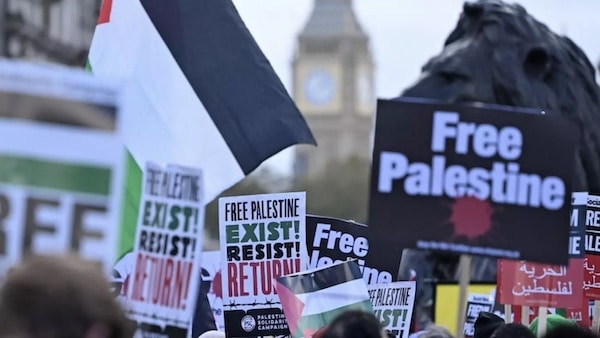The UK government is seeking to broaden the definition of extremism to include anyone who “undermines” the country’s institutions and its values, according to a report in the Observer newspaper.
The plans are being prepared by civil servants working for Michael Gove, the Secretary of State for Levelling Up, Housing and Communities.
Some officials who oppose the plans told the Observer the proposal would label legitimate individuals and organizations as extremists.
“The concern is that this is a crackdown on freedom of speech. The definition is too broad and will capture legitimate organizations and individuals,” one Whitehall official said.
Leaked internal documents from Gove’s department, marked “official—sensitive” reportedly state the definition could “frame a new, unified response to extremism”.
It lists several organisations which it considers would be “captured” by the definition.
Among them are the Muslim Council of Britain (MCB), Palestine Action and Mend (Muslim Engagement and Development).
“Extremism is the promotion or advancement of any ideology which aims to overturn or undermine the UK’s system of parliamentary democracy, its institutions and values,” the document says.
‘Criminalise dissent’
Civil rights groups have warned the move would “criminalise dissent”, and would significantly suppress freedom of expression.
“This proposed change would be a reckless and cynical move, threatening to significantly suppress freedom of expression,” Akiko Hart, interim director at Liberty told the Observer.
Expanding the definition so far beyond the current guidance risks further discouraging individuals and groups from legitimately exercising their right to free speech, while allowing the government to crack down on community groups, charities or faith groups they disagree with.
Ilyas Nagdee, Amnesty International UK’s racial justice director, said:
This definition must not be accepted or implemented.
The definition of extremism and its usage in counter-terrorism policies like [counter-terrorism strategy] Prevent is already being applied so broadly it seeks to effectively hinder people from organizing and mobilizing. The proposed definition takes this even further and could criminalise any dissent.
The proposals were revealed after a week in which UK Home Secretary Suella Braverman described pro-Palestinian demonstrations in London as “hate marches” and said the UK government stood “foursquare in support of Israel”.
Braverman has previously called on police to investigate whether waving Palestinian flags or pro-Palestinian chants could amount to public order or hate crime offences.
Protesters took to the streets of London for the fourth week in a row on Saturday.
Thousands assembled in London’s Trafalgar Square, while others staged a sit-in at Oxford Circus.
The ongoing Israeli onslaught on the besieged Gaza Strip has killed an estimated 9,572 Palestinians since the start of the war on 7 October, including at least 3,900 children and 2,500 women.
The bombardment came after Hamas’ surprise attack on southern Israeli communities, which killed around 1,400 Israelis and led to over 240 captives being taken to Gaza.
Restrictions and monitoring
The latest government proposals follow a call for schools in the UK to report students who speak up for Palestinian rights to Prevent.
Earlier this month, education ministers wrote to schools to urge them to make Prevent referrals, warning that “events in the Middle East” could be “used as an excuse to stir up hatred in communities”.
London’s Metropolitan Police has also reportedly been ordered to step up intelligence-gathering activities and “increase their visible patrols” at schools in response to the war in Israel and Palestine.
Concerns about an increase in Palestine-related Prevent referrals come as Amnesty International called for the contentious counter-terrorism programme to be scrapped on Thursday.
In a new report, Amnesty highlighted Prevent-linked restrictions and monitoring of Palestinian activism at universities and by other public bodies as examples of violations that it said amounted to breaches of international human rights obligations.
It said that many people had reported to having changed their behaviour on issues deemed to be contentious. That included sharing views on Palestine, or Israeli policies and actions considered by human rights group to constitute apartheid,
for fear of being seen as an extremist or a terrorist sympathizer.
‘Serious concerns’
Campaign organisations Open Rights Group and Prevent Watch said they had “serious concerns that current government advice to schools will place pupils and their teachers at risk rather than enabling discussion and proper debate of the topics”.
They said that more than 45,000 Prevent referrals had been made since a Prevent Duty was introduced in schools and other public sector bodies in 2015.
Many resulted in no further action, but still had “potential ramifications” for young people referred, according to Sophia Akram, program manager at Open Rights Group, which campaigns for freedom of privacy and free speech.
“They should not face the threat of being interviewed by counter-terrorism police,” said Akram.
“The reality is that the referral becomes a stain on their record, which could be shared between multiple databases between police forces, local authority systems and other records—possibly indefinitely.”
Prevent has been widely criticised as discriminatory against Muslims by human rights groups and monitors.
Layla Aitlhadj, director of Prevent Watch, which supports people affected by the program, said:
Young people should be able to develop their ideas and have them discussed and challenged in an environment that supports them.
They should not face the threat of being interviewed by counter-terrorism police. Young Muslims should not be made to feel that their voices should not be heard.
In its 2 November report titled “This is the Thought Police”, Amnesty said the extension of Prevent into schools and other public sector settings had led to violations of rights to freedom of expression, freedom of thought and conscience, freedom of religion, freedom of peaceful assembly, and rights to equality and non-discrimination.
It said the report documented “a pattern of racial discrimination and the stigmatization of Muslims”.

